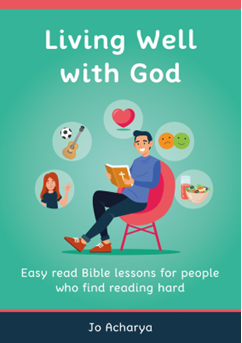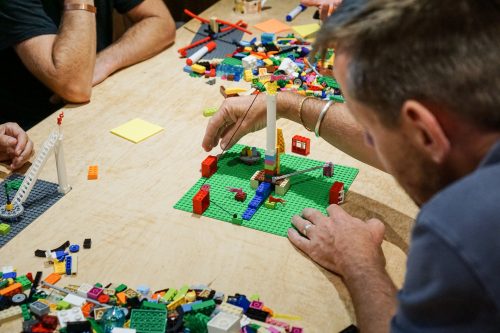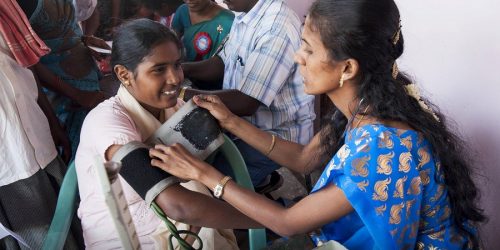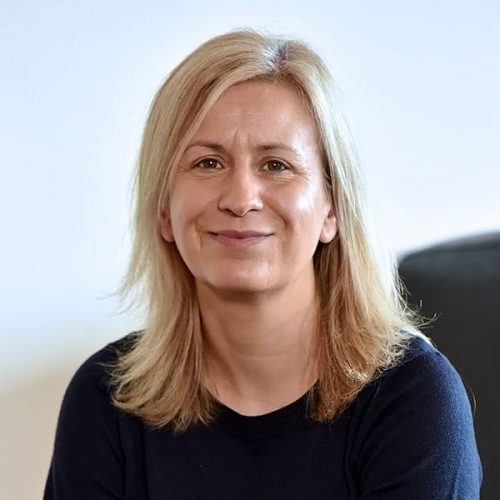 Around 1.5 million people in the UK are diagnosed with a learning disability – a condition which affects a person’s ability to understand new or complex information. Yet, resources to help those with learning disabilities to mature in their Christian faith, and to know the love and provision of God amidst mental health struggles and other difficulties, are often in painfully short supply.
Around 1.5 million people in the UK are diagnosed with a learning disability – a condition which affects a person’s ability to understand new or complex information. Yet, resources to help those with learning disabilities to mature in their Christian faith, and to know the love and provision of God amidst mental health struggles and other difficulties, are often in painfully short supply.
Jo Acharya, who has 18 years of experience as a support worker and music therapist for people with learning disabilities, is fighting to change this. In her new book, Living Well with God: Easy read Bible lessons for people who find reading hard, Jo provides an accessible resource that meets the spiritual needs of adults with learning disabilities, helping them advance in their Christian walk, and discover God’s provision in the core areas of human life.
There aren’t many Christian resources designed for adults with learning disabilities in the church
“There aren’t many Christian resources designed for adults with learning disabilities in the church. And too often, they are left using children’s books to navigate their faith. This fails to honour their dignity and their need for resources that align with their adult experiences and life stages”, says Jo.
“Currently, there aren’t enough people or organisations producing easy read Bible studies. This is a huge issue, because more than 2% of the population have a learning disability and more than 16% of adults have very poor literacy skills. This also includes half of prisoners. So there are likely a lot of people in our churches and certainly many people we’d like to reach with the Gospel who cannot access the Christian books and discipleship resources they need.”
Living Well with God – presented in a simplified format with dyslexia friendly font, colour pictures and a clear, uncluttered layout to support understanding – is the ‘easy read’ version of Jo’s first devotional book, Refresh.
Refresh was born out of Jo’s experience of living with cystic fibrosis, wrestling with God through suffering, and her desire to create a devotional that helps us relate to God in all areas of life – from our mental, physical, and spiritual health, to managing emotions, our need for rest, and understanding our identity in Christ – even when we feel far from God, or the thought of Bible study feels overwhelming.
Living Well With God was created from the knowledge that people with learning disabilities can have the same challenges with emotional and mental health as the rest of the population, but often find it hard to process or communicate their struggle, and need the same spiritual guidance to wellbeing in God as we do.
“The Kingdom of God belongs to such as these” (Luke 18:16)
Living Well With God opens up a fascinating conversation into accessibility in faith communities and the church, and who we consider worthy of having a spiritual life. Rather than discount the importance of people’s spiritual advancement when they have conditions that we don’t understand or aren’t familiar with, we must understand that the call for us to grow up in the faith from milk to solid food (1 Corinthians 3:2), and to remain in the vine (John 15), is a call for every single person who believes. It is the role of the church to ensure everyone has access to the word of God in a way that allows them to advance in the faith, whatever their learning needs.
Jo also raises the point that, while we often think of adults with learning disabilities as people who only exist to be ministered to in Christian circles, the fact is that:
Jesus famously said that God’s kingdom belongs to people who are like little children (Luke 18:16). That includes those who can’t understand complex theology, who depend on others’ care, and who are often overlooked and underestimated.
“Jesus famously said that God’s kingdom belongs to people who are like little children (Luke 18:16). That includes those who can’t understand complex theology, who depend on others’ care, and who are often overlooked and underestimated. The fullness of God’s goodness and grace and the transforming power of the Holy Spirit is not just available to these people; it belongs to them. Our brothers and sisters with additional needs are a vital part of the body of Christ, and the whole church is blessed when they are fully involved”.
If the Kingdom of God belongs to those with learning disabilities (and others like them), then the church has an infinite amount to learn from them spiritually, not least the truth that in God’s economy, human beings are valued not by what they can produce in the eyes of society, but on who they are – made in His image and, if they accept Christ’s sacrifice on the cross, saved through His son.
As the Apostle Paul writes in 1 Corinthians, the body of the Church does not consist of one member, but many. A single part cannot work in isolation, nor seek to change its identity or function, but all parts must work together to achieve their God-given purpose in Christ.
Jo says: “I’d love to see this book used as a resource for groups catering to people with additional needs, and also used by individuals as a devotional. It’s also a useful resource for churches and Christian ministries to have on hand to support anyone who finds reading hard. Because of the simple English I also hope it will be helpful for refugee ministries, particularly with those who haven’t had access to Christian resources in their own language, as well as prison ministries, because over half of prisoners in the UK have low reading ability.
There are a lot more people in our communities who struggle with reading than most of us realise. My biggest hope is that it will draw many people closer to God and help them to learn more about him and his love for us”
Living Well With God is available from good bookshops and online outlets. Alongside Living Well with God, Jo also provides free easy read resources on her website including a devotional blog, articles about the basics of Christianity and downloadable Bible study worksheets.










